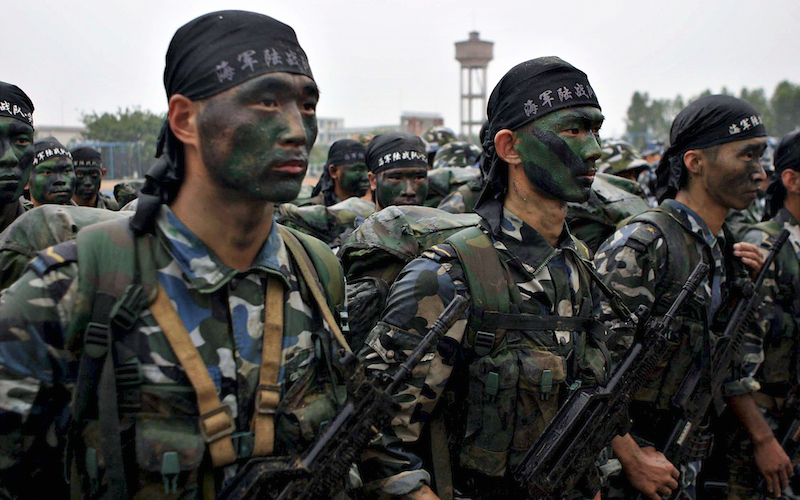
Non-Intervention Drives Chinese Foreign Policy
Non-intervention, the support of rogue regimes, and the pre-eminence of economic concerns have all been, for better or worse, historical trademarks in Chinese foreign policy for several decades. A decade ago, these guiding worldviews were all a given from the Beijing perspective. But now, with the nation’s “meteoric” rise to global power-status, all of that is more subject to change than one might think. That’s right: the evidence is building — in a gradual trickle, but nonetheless present — for serious changes in China’s approach to issues of international human rights.
The nation, now an economic powerhouse with established (and growing) authority in world affairs, is (slowly) loosening its attachment to strict interpretations of sovereignty, (sometimes) rolling back its support of nefarious nations, and (once in a while) forgoing the lucrative economic benefits that come with turning a blind eye. It is a transition towards a foreign policy more in sync with Western standards of human rights that is by no means clear cut and is, undoubtedly, often quite puzzling. Among the most puzzling of areas of transition is seen in China’s relationship with the now ten-years established international human rights and security norm, the responsibility to protect (R2P).
Unanimously approved by the UN General Assembly at the 2005 World Summit, R2P is a reconceptualization of sovereignty from innate right to earned responsibility that came as a response to the failures of the international community in humanitarian crises like Rwanda and Bosnia — instances of genocide and other mass atrocities against civilians.
As this reconceptualization goes, it is the responsibility of a state to protect its population, and when it fails to do so, the right to sovereignty is revoked. In the event that a state does not protect its population, R2P dictates that it is then the responsibility of the international community to intervene.
Leading up to intervention under R2P are initially more amicable measures like the extension of foreign aid or offers of assistance, then leading through coercive means and into, finally, military intervention. The implementation of R2P is, naturally, handled through the UN Security Council.
Thus, R2P is assuredly contrary to several traditional qualities of Chinese foreign policy, primarily its purely self-defensive military guideline and extensive economic ties to nations with less-than-stellar human rights records. Furthermore, China’s position as a permanent, veto-wielding member of the UN Security Council places it in a particularly powerful position to shut down the implementation of R2P, with the potential to act as a “gatekeeper” of the norm’s evolution in the international discourse.
And yet, against the stream of conventional wisdom, China has gradually warmed its position towards the R2P principle since its endorsement in 2005. When R2P was first conceived in 2001, China flatly rejected the norm as a perpetuation of Western hegemony. By 2005, however, China participated in the universal endorsement of R2P by the UN General Assembly, signalling a slightly less resistant position.
This trajectory continued, albeit gradually, in successive instances where R2P was considered. In the case of Myanmar (otherwise known as Burma), for instance, where mass human rights violations have been committed against ethnic minorities since before R2P was even conceived, China demonstrated a modest continuation of its weakening support for rogue regimes. In January of 2007, the UN Security Council proposed a resolution that condemned the violations in Myanmar in an attempt to prevent the situation from intensifying – a measure which China vetoed, citing a lack of support from the leading regional institution. However, following widespread international criticism, Beijing scaled back its opposition and supported the issuing of a Security Council statement that criticized the Burmese government for its abuses and called for the humane treatment of all civilians within its borders.
Though the statement stopped short of invoking R2P, the development symbolized a step in Chinese foreign policy towards the greater appeasement of its international peers. At around the same time, pundits and scholars alike began to suggest that China would begin easing back on its strict conception of sovereignty and support of unlawful governments out of growing concern for its international image through a process known as socialization. As the narrative went, China’s increased presence in international affairs would subsequently lead to an increase in international criticism towards its actions, in turn slowly nudging Beijing to adjust its foreign policy and accommodate established Western preferences. In short, the “insecure global power” would have no choice but to begin adhering to more acceptable standards on international human rights, lest to risk its mounting international clout.
For a time — and to the optimistic delight of activists worldwide — the socialization of China appeared to be a growing reality. In February 2011, following regional instability precipitated by the Arab Spring, Libyan Dictator Muammar Gaddafi oversaw mass human rights violations in attempts to quell unrest, perpetuating a violent civil war that resulted in heavy civilian casualties. In response, the UN Security Council proposed the first sanctioning of R2P to authorize military intervention in Libya without Gaddafi’s consent. Through abstaining from the vote entirely, China allowed the resolution for intervention to pass — explicitly citing both regional support as well as broad international support — and in March 2011 the military intervention began.
China’s abstention from the Libyan vote was crucial for two reasons in suggesting changes in its long-held foreign policy principles. For one, the allowance of military intervention on the grounds of human rights violations without consent from the state authority was a direct refutation of Beijing’s interpretation of the sanctity of sovereignty. Furthermore, and arguably even more surprising, China allowed a Western-style military intervention against a Libyan regime with which it held highly lucrative economic ties. Not only is the PRC a heavy importer of Libyan oil, it had just struck a $4 billion railroad investment deal at the onset of the civil war.
Until that point, China’s long held policy of non-intervention and strict interpretation of sovereignty had provided it with substantial economic opportunity, capitalizing on rogue governments such as Zimbabwe, Sudan, Myanmar, and Libya – where international interest is few and far between. But the Libyan vote suggested a trend away from such relationships, with China’s socialization within the international sphere leading it to favor its global image over prospective economic gains where human rights were concerned.
This optimistic note, however, has lost its believability in more recent years. Following its showing in Libya, many thought that China would allow similar intervention to take effect in the on-going crisis in Syria, where civilian casualties now number in the hundreds of thousands. Yet since the civil war began, China has vetoed three UN Security Council resolutions seeking to implement R2P in Syria. More recently, in March of 2014, China vetoed a fourth resolution that sought to refer the Syrian case to the International Criminal Court on the premise of mass crimes against humanity.
So, what happened to the socialization of China? What halted its progress so abruptly? The question is a puzzle without a clear answer, though there are two notable aspects at hand.
For one, China’s refusal to allow intervention in Syria could feasibly reflect a move to protect more valuable Middle Eastern interests. Though a puzzling aspect of the Syrian case is its rough equivalency in economic terms to Libya, the importance of the Assad regime to Iranian strategic calculations might provide enough insecurity in Beijing to forgo the prospect of intervention.
The more important factor, however, appears to be the overall experience of R2P and Libya. Following the 2011 intervention, China became critical of the operation for “exceeding the mandate provided by the resolution,” believing that the focus had shifted from protection to politically motivated regime-change and instead stressed the need for “complete and strict implementation of the relevant resolutions of the SC.” This criticism has lead China to be more skeptical of future considerations of R2P, as seen in the Syrian case.
For now, the negative experiences of China in the Libyan application of R2P have in effect halted the socialization process. Concerns for Middle Eastern allies may indeed also have weakened the trend of socializing China. Regardless of the origins, the reversal of China’s socialization presents a new stage in China’s growth as a global power, perhaps renouncing its concerns for a responsible international image in the West and instead pursuing a more maverick, influential role in shaping the ways in which international human rights norms like R2P are interpreted and implemented.

